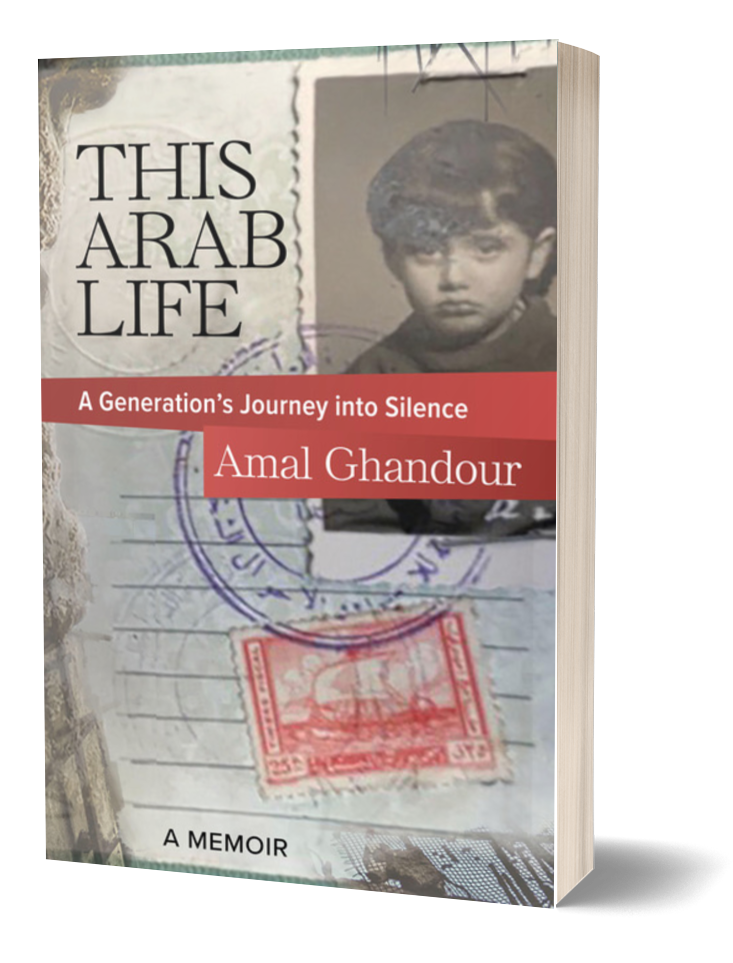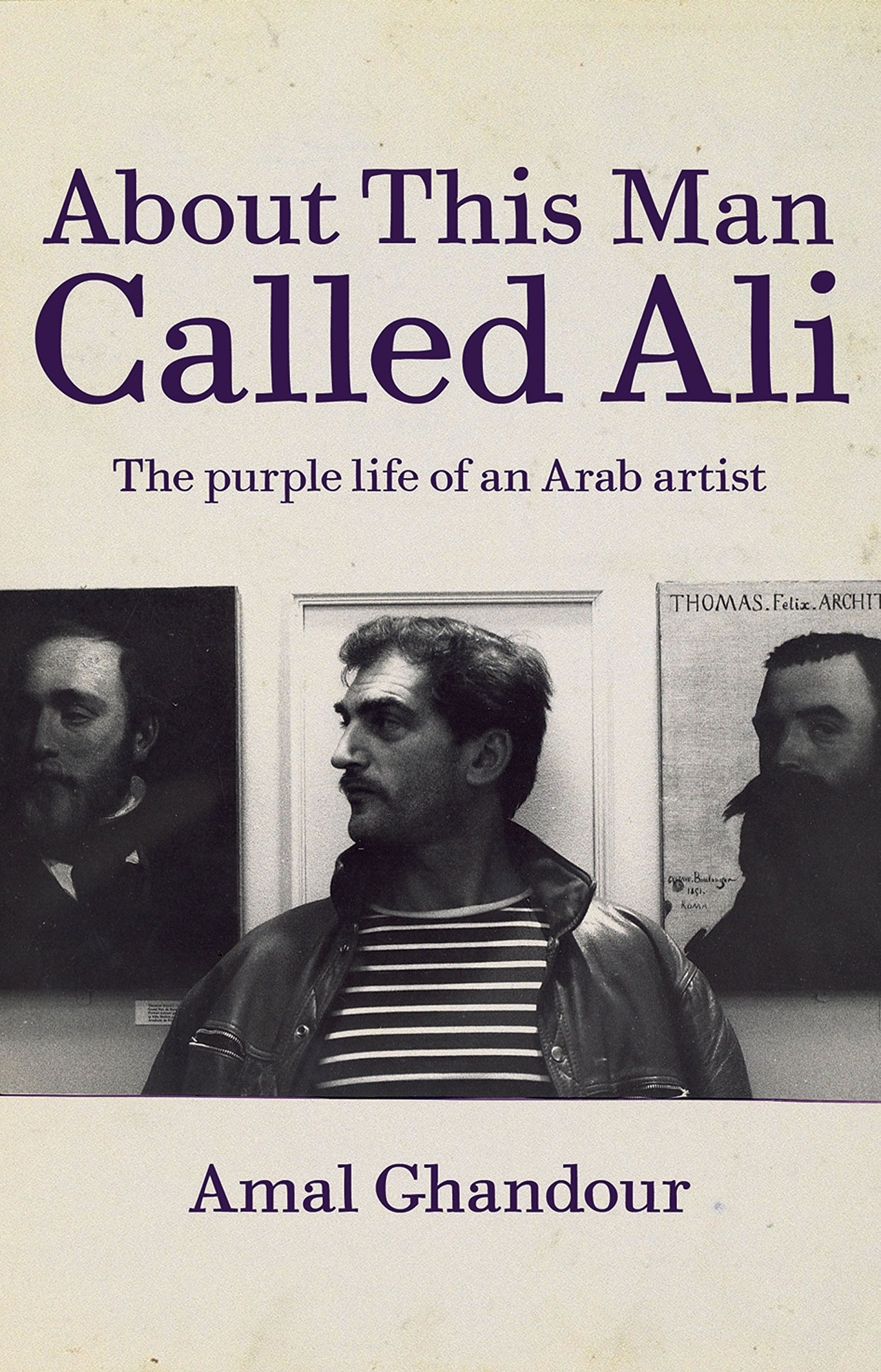This Arab Life

This Arab Life: A Generation's Journey Into Silence
This Arab Life is an intimate and honest exploration of a rising Arab generation’s descent into silence. Personal and panoramic, granular and sweeping, the book offers a raw account of the unremitting mire that anticipates the region’s present-day chaos.
In an unusual twist, the author, a daughter of the Levant who claims Jordan and Lebanon as her homes, locates her own privileged class in this painful history and holds a mirror to herself and her fellow travelers. In doing so, she threads a generational tale with grit, color, and nuance.
This Arab Life begins in Amman in the Summer of 1973, and concludes in Beirut in December 2021. But the narrative encompasses a world by turns distant and faded, near and vital.
Order your copy today
Advance Praise
Unsparing of herself as “informant,” in a book that is at once painful and a delight to read, Amal Ghandour probes the conscience and circumstances of a small but very influential section of Arab society. Stylish, witty, and heartbreaking, this is a unique and critical contribution to our current soul-searching. —Ahdaf Soueif is a novelist, an essayist, and an activist.
Amal Ghandour has written a nostalgic book with glimmers of brilliant personal, social and political observations and probing about Jordan and Lebanon, about wars and longings, about a rich life of upheavals and laments. —Raja Shehadeh, Palestinian writer and lawyer, and founder of the human rights organization Al-Haq
This Arab Life is a sweeping retrospective on a generation’s historic complicity in the present travails plaguing the Arab world. The book is, at once, intimate, far reaching, political, angry, melancholic, funny, and nostalgic. Ghandour’s reflections on her life, and on the decisions taken by her and her peers as they came of age in the eighties and nineties, offers important insight for anyone seeking to understand how we got to where we are today in the region. The book is a cautionary tale of political acquiescence, and one that is, like many Arabs, stuck between an urgent impulse to act, to change, to hope, alongside an overwhelming sense of despair and apathy.
—Tarek Baconi, Author of Hamas Contained: The Rise and Pacification of Palestinian Resistance and president of the board of al-Shabaka: The Palestinian Policy Network.
The Arab world hasn’t fallen into silence. It has descended, not unlike other parts of the globe, into a logorrhea of reflexive grumbling, vacuous politics, and hopeless nostalgia. Amal Ghandour’s voice pierces through this noise: analytic, female, rebellious, acid yet soothing, if only because so much of the corrosion she describes is just begging for her brand of intellectual rust remover. Amal taunts the very elites she belongs to with questions few of the privileged ever ask themselves: Wealth aside, what is our worth? Who are we, as an elite, if we do little more than indulge and free-ride? Her own answers rise from a unique blend of acute insights, touching vignettes, and downright introspection, all caught up in the region’s traumatic historical arc, and bound together by Amal’s ever so tight, elegant style. — Peter Harling is the founder of Synaps, a public interest research Institute
Reviews
Born of Lebanese parents and having spent most of her formative years in Jordan from the 1960s through to the early twenty-first century, Amal Ghandour was part of a generation that saw and experienced the unsparing tide of Arab politics and its unhappy consequences. Amal’s family, including her father, had moved to Jordan after her father was sentenced to death in Lebanon. From the perspective of a member of the upper classes in her society, which was Amal’s background, she gives a lucid account of her life and encounters as she grew up in the Levant region in This Arab Life: A Generation’s Journey Into Silence. Get yourself Amal’s memoir to find out more.
Amal Ghandour’s memoir took me through an eventful and emotional ride that was riddled with heart-wrenching, agonizing, and yet at the same time, gratifying and witty anecdotes. She paints a perfect picture of what her childhood involved, and most importantly what it felt like growing up as an Arab girl. She captures the mood and setting of her Arabian homeland, enunciating the tension that pervaded the social and political norms of the region. Amal addresses many sensitive topics that span religion, politics, and family. She graces her narration with pictures and quotes which made the reading experience engaging. This Arab Life will appeal to enthusiasts of culture and politics.— Keith Mbuya
Community development specialist and author Ghandour reflects on her life growing up amid the political tumult of the Middle East and her generation’s response to it.
The author was born in Lebanon in 1962, but when she was only 5 months old, her family was compelled to flee the country for Jordan when her father, Ali, was sentenced to death by the Lebanese state for his alleged involvement in an attempted coup. She was raised in Amman and experienced a peculiar kind of stability in the wake of its civil war, which finally settled into an “ugly memory.” Still, there were always paroxysms of unrest—so many, in fact, that they became nearly indistinguishable from the normal rhythms of life and led to a kind of acquiescent “atrophy,” as the author puts it. Ghandour’s experience was colored by her own privilege, which provided her family with a means of escape and her with an education in the United States that afforded her a taste of “unencumbered aliveness.” However, the author also tells of being plagued by the “listlessness” of a generation that came of “political age” in the 1980s but had allowed itself to be silenced—a predicament that Ghandour affectingly portrays in these pages. Specifically, her account includes an astute interpretation of the uprisings that roiled the Arab world in 2011—the shock of their promise as well as their disappointments: “I don’t know if my generation understood the meaning of what we saw…or if we knew, were at a loss about our options, and so decided to sell out.” Over the course of this memoir, her prose is poetically precise and as sharp as her encounter with cultural and philosophical ambivalence permits. Overall, this is a disarmingly candid memoir in which Ghandour takes herself and her entire generation to task for the manner in which they may have been complicit in the Arab world’s political failures. As such, it’s a gripping remembrance and one that’s as clear as it is dramatic.
An unflinching depiction of an author’s complex international experiences.— Kirkus Reviews
“In ‘This Arab Life: A Generation’s Journey into Silence’ (2022), Amal Ghandour presents a solitary vision—sacred in its documentation of the past and its fragmentary exploration of the Arab self, informed by a past unseen and an experience unforgotten. This is a memento and a memoir, both; it is a recollection of Ghandour’s experiences as a young Arab in the folds of turmoil and silence, punctuated with whimsical remembrances of a Amman and Beirut that, to many, no longer exist.”
Mona Abdo, — Egyptian StreetsA mix of memoir and commentary, this slim volume offers an unusually candid glimpse into the rueful bewilderment of Arab elites…In taking readers into her confidence, Ghandour reveals the pain of a generation thwarted by avarice and autocracy.”
Lisa Andersen, Foreign AffairsThe writing is intimate, gripping, and so wonderfully done. Not only does Amal seamlessly weave in actual historical moments with her more personal back story, but it’s also an eye-opening read into the lives of a group of young people who grew up as the Middle East begin to change into a place of political turmoil.”
The mistress of booksما يلفت النظر في المذكرات هو ذاكرة المدن التي تستعرضها غندور. تخبرنا كيف تغير شكل عمّان، وكيف لاحظت أنها ليست الوحيدة التي انتبهت الى هذا التغير، تشير إلى ما كتبه السوري وائل السواح، عن تغيّر مدينة دمشق في السبعينات، وكيف أصبحت أكثر “إسلاميّة”، لكن في خضمّ الذكريات وما تشهده المنطقة واستمرار الحياة “العاديّة”، تلخص غندور ما تشعر به “أكبت داخلي، أتكيف، وأتابع المشي، مرتاحةً مع طبقات من العزلة الداخليّة” أشبه بألعاب نفسيّة “نـ”ـمارسها على أنفسنا كي نتمكن من النجاة، خصوصاً بعد النكسة، الهزيمة التي تركت أثراً لا يُمحى.
عمّار المأمون، درج
New Lines Magazine chooses This Arab Life As One of the Best Books of 2023
Published this year, this book manages to combine a close and personal memoir with a description of a huge arc of Arab history. Portraying recent events in the Levant through the lens of her own life, Ghandour shows how a generation acquiesced to the hijacking of their countries, choosing stability in return for their silence.
In some senses, then, this is a “small” book — and it is literally small, coming in at under 160 pages of a slight format — covering family life, childhood fun and adult responsibilities. Yet the scope is as vast as the Arab world itself, taking in social conventions and how they’ve changed, the relationship between ruler and ruled, the different aspects of religion and religiosity, the role and effect of “education,” how the personal and political interact, corruption, education, economics, privilege and poverty.
It is in fact how my favorite essays work, with compelling personal stories interwoven with broader intellectual points, the one illuminating the other to make it more than the sum of its parts, accessible. A gripping read, intriguing for both experts and novices of the Middle East alike.

